- Home
- Raymond Chandler
The World of Raymond Chandler Page 3
The World of Raymond Chandler Read online
Page 3
—Letter to Hamish Hamilton—November 10, 1950
There was a distinct sameness about the content of pulp stories which—as with any form of literature— was attributable in large part to the social context.
Today we have “police procedurals,” which follow—and to a degree extol—modern methods of detection. In the thirties the heroes were invariably lone private eyes, to some extent Robin Hoods, for the simple reason that the public didn’t trust the police. Corruption was seen to be rife, and so a cop, by definition, couldn’t be a credible hero. The genre was defined by that fact alone.
1924. The Chandlers’ marriage license. Cissy was actually ten years older than the date she gave. To Chandler she was “the beat of my heart for thirty years.” (illustrations credit 2.2)
1920. The Accounting Department of the Dabney Oil Syndicate. Chandler is on the extreme left of the back row. Bodleian Library, Oxford (illustrations credit 2.3)
“I had to learn American just like a foreign language …” (illustrations credit 2.4)
Black Mask. “It struck me that some of the writing was pretty forceful and honest.” (illustrations credit 2.5)
Violence in the stories was de rigueur—partly because the readers of the pulps had come to expect it and partly because it reflected the current reality of the Prohibition era, when armed confrontation between rival mobs was commonplace. The body count in Chandler’s first story, “Blackmailers Don’t Shoot,” probably exceeded the sum total of all the subsequent novels.
First Chandler had to learn the language. “To learn it I had to study and analyze it. As a result, when I use slang, colloquialism, snide talk or any kind of off-beat language, I do it deliberately” (Letter to Alex Barris—March 18, 1949). “It would seem that a classical education might be rather a poor basis for writing novels in a hard-boiled vernacular. I happen to think otherwise. A classical education saves you from being fooled by pretentiousness, which is what most current fiction is too full of,” he wrote to producer John Houseman and to Hamish Hamilton. “If I hadn’t grown up with Latin and Greek, I doubt if I would know so well where to draw the very subtle line between what I call the vernacular style and what I should call an illiterate or faux naïf style.”
The Black Mask Gang. The first Black Mask West Coast Get-Together, January 11, 1936. This dinner was the only occasion Chandler and Dashiell Hammett ever met. Left to right, seated: Arthur Barnes, John K. Butler, W. T. Ballard, Horace McCoy and Norbert Davis. Standing are Raymond T. Moffatt, Chandler, Herbert Stinson, Dwight Babcock, Eric Taylor and Hammett. Bodleian Library, Oxford (illustrations credit 2.6)
He was never comfortable in the role. As late as 1950 he was telling Hamish Hamilton,
As a mystery writer I think I am a bit of an anomaly, since most mystery writers of the American school are only semi-literate, and I am not only literate but intellectual, much as I dislike the term.
He was an apt student, as many other writers—such as Nabokov, Conrad and Stoppard—have proved to be when they learned another language in their maturity. He took five months to polish “Blackmailers Don’t Shoot,” an 18,000-word novella for which he received $180 from the leading pulp magazine, Black Mask. “This was in the great days of the Black Mask (if I may call them great days),” when a writer for the pulps had to produce a million words to earn $10,000.
All I wanted to do … was to play with a fascinating new language, to see what it would do as a means of expression which might remain on the level of unintellectual thinking and yet acquire the power to say things which are usually only said with a literary air. I really didn’t care what kind of story I wrote; I wrote melodrama because, when I looked around me, it was the only kind of writing I saw that was relatively honest.
—Letter to Dale Warren—January 7, 1945
Not only was it “honest”—it had vitality,
Even at its most mannered it made most of the fiction of the time taste like a cup of lukewarm consommé at a spinsterish tea-room.
—Introduction to Trouble Is My Business
[In preparing “Blackmailers”] I did something I have never been able to persuade any other writer to do … I made a detailed synopsis of some story—say by [Erle Stanley] Gardner … and then tried to write the story. Then I compared it with professional work and saw where I had failed to make an effect, or had the pace wrong, or some other mistake. Then I did it over and over again.
—Letter to James Howard—March 26, 1957
“Analyze and imitate” was a credo he followed throughout his career. “Any writer who cannot teach himself cannot be taught by others.”
He was greatly taken—both then and later—with the special qualities of “American English” and at one point tried to analyze it. Again, the classical education was in evidence:
It is a fluid language, like Shakespearean English, and easily takes in new words, new meanings for old words … It is more alive to clichés … its impact is sensational rather than intellectual … It is a mass language … which is being molded by writers to do delicate things and yet be within the grasp of superficially educated people.
He was critical of the way the average American appeared to undervalue it. “You hear American doctors and lawyers and schoolmasters talking in such a way that it is very clear they have no real understanding of their own language … All the best American writing has been done by men who are, or at some time were, cosmopolitans … but they had to have European taste to use the material.”
And as for Americans in general …
The average “educated” American has the all round mental equipment of a fourth form boy in an English public school.
He was under no illusion that the road ahead was likely to be paved with golden kudos. Nonetheless, it was his ambition, he said, “to get murder away from the upper classes, the weekend house party, and the vicar’s rose garden and back to the people who are really good at it.”
Dashiell Hammett (1884–1961). Chandler wrote, “Hammett is the ace performer … he was spare, frugal, hard-boiled, but he did over and over again what only the best writers can ever do at all. He wrote scenes that seemed never to have been written before … The gulf between Hammett and the merely rough boys seems to me vast.” Photofest (illustrations credit 2.7)
In this country the mystery writer is looked down upon as sub-literary merely because he is a mystery writer rather than, for instance, a writer of social significance twaddle. To a classicist—even a very rusty one—such an attitude is merely a parvenu insecurity.
—Letter to Hamish Hamilton—November 10, 1950
“After that [“Blackmailers”] I never looked back, although I had a good many uneasy periods looking forward,” he wrote to Hamilton. In the five years that followed, he began to build a reputation in the ten-cent pulp magazines, such as Dime Detective and Detective Fiction Weekly—Black Mask cost an impressive fifteen cents—until he was earning $400 a story when it appeared on the cover. Even so, “Mine was, of course, a losing game. I wrote pulp stories with as much care as slick stories. It was very poor pay for the work that I put into them.”
Nonetheless, he was learning his trade—and he had a lot to learn besides the nuances of this new language:
When I started out to write fiction I had the great disadvantage of having absolutely no talent for it … If more than two people were on scene I couldn’t keep one of them alive. A crowded canvas just bewilders me. Give me two people snotting each other across a desk and I’m happy.
—Letter to Paul Brooks—1949
I couldn’t get a character in or out of a room, I couldn’t even get his hat off.
—Letter to Wesley Hartley—December 3, 1957
The stories would often be suggested by something he happened to read in the papers or overhear:
I learn something too hot for the papers to publish, and it starts me thinking, and then my imagination takes over.
James M. Cain (1892–1977). Photofest (illustrations credit 2.8)
>
The idea of Geiger, the homosexual who runs a private pornography library in The Big Sleep, was supposedly inspired by such a tip.
He was also studying his established competitors—the Dashiell Hammetts, the Erle Stanley Gardners and the James M. Cains, but also the rest of the following pack. “A schoolmaster of mine long ago said—‘You can only learn from the second-raters. The first-raters are out of range; you can’t see how they get their effects.’ There is a lot of truth in this” (Letter to Helga Greene—April 30, 1957).
Hammett was a good example. “He had style, but his audience didn’t know it because it was a language not supposed to be capable of such refinements. From “The Simple Art of Murder”:
Hammett took murder out of the Venetian vase and dropped it into the alley …
Hammett is the ace performer …
He was spare, frugal, hard-boiled, but he did over and over again what only the best writers can ever do at all. He wrote scenes that seemed never to have been written before.
He served the supreme purpose—Chandler claimed—of “giving the detective story back to people who commit murder for a purpose and not just to provide a corpse.”
Chandler concluded early on that “the great fault of American mystery writers … is a lack of texture, a sort of naiveté which probably comes from them not being very well educated or well read” (Letter to Dorothy Gardner—January 1956).
He had a particular admiration for the technical expertise of the prolific Erle Stanley Gardner:
The ability to put over situations which verged on the implausible but which in the reading seemed quite real … I have never come even near to doing it myself. Dumas had this quality in a very strong degree. Also Dickens. It’s probably the fundamental of all rapid work, because naturally rapid work has a large measure of improvisation, and to make an improvised scene seem inevitable is quite a trick … And here I am writing about technique, in spite of a strong conviction that the moment a man begins to talk about technique, that’s proof he’s fresh out of ideas.
—Letter to Erle Stanley Gardner—May 5, 1939
Erle Stanley Gardner (1889–1970). Photofest (illustrations credit 2.9)
Ernest (“Papa”) Hemingway (1898–1961).
“Who is this Hemingway person at all?”
“A guy that keeps saying the same thing over and over until you begin to believe it must be good.” —Farewell, My Lovely
I suppose the weakness, even the tragedy, of writers like Hemingway is that their sort of stuff demands an immediate vitality; and a man outgrows his vitality without unfortunately outgrowing his furious concern with it. —Letter to Charles Morton—October 9, 1950
Photofest (illustrations credit 2.10)
Chandler and Gardner formed a mutual admiration society. Chandler felt Gardner “owed nothing to Hammett or Hemingway” (the ultimate compliment), while Gardner called Chandler “a star of the first magnitude.”
I wish I had one of those facile plotting brains, like Erle Gardner.
Gardner was highly prolific and used to dictate his dozens of books. He was also very talkative, and it amused Chandler that “years of yapping into a Dictaphone machine have destroyed the quality of his voice, which now has all the delicate chiaroscuro of a French taxi horn.”
He was prepared to admit that
Hammett is all right. I give him everything. There were a lot of things he could not do, but what he did he did superbly. But James Cain—faugh! Everything he touches smells like a billygoat. He is every kind of writer I detest, a faux naïf, a Proust in greasy overalls, a dirty little boy with a piece of chalk and a board fence and nobody looking. Such people are the offal of literature, not because they write about dirty things, but because they do it in a dirty way. Nothing hard and clean and cold and ventilated. A brothel with a smell of cheap scent in the front parlor and a bucket of slops at the back door. Do I, for God’s sake, sound like that?
—Letter to Blanche Knopf—October 22, 1942
From the outset he hoped the day would come “when I don’t have to ride around on Hammett and James Cain, like an organ grinder’s monkey.”
Ironically, it was his 1943 screenplay of Cain’s Double Indemnity—in collaboration with director Billy Wilder—that earned him the first of his Academy Award nominations.
I suppose the weakness, even the tragedy, of writers like Hemingway is that their sort of stuff demands an immense vitality; and a man outgrows his vitality without unfortunately outgrowing his furious concern with it.
—Letter to Charles Morton—October 9, 1950
About Ernest Hemingway he was always in two minds but the down side of the balance tipped as the years went by. In 1942 he is confiding to Blanche Knopf (October 22) that
Hemingway with his eternal sleeping bag got to be pretty damn tiresome but at least Hemingway sees it all, not just the flies on the garbage can.
And later,
Even Hemingway has let me down. I’ve been re-reading a lot of his stuff. I would have said here is one guy who writes like himself, and I would have been right, but not the way I meant it. Ninety percent of it is the goddamnest self-imitation. He never really wrote but one story. All the rest of it is the same thing in different pants—or without different pants.
As early as 1932—before he had begun to establish his own credentials—he had written an affectionate parody of the eminently parody-able Hemingway style (“Dedicated with no good reason to the greatest living American novelist”), which read in part:
Hank drank the alcohol and water.
It was warm all the way down. It was warm as hell. It was warmer than whiskey. It was warmer than that Asti Spumante they had that time in Capozzo when Hank was with the Arditi. They had been carp fishing with landing nets. It had been a good day. After the fourth bottle of Asti Spumante Hank fell in the river and came out with his hair full of carp. Old Peguzzi laughed until his boots rattled on the hard grey rock. And afterward Peguzzi got gonorrhea on the Pave. It was a hell of a war.
In Farewell, My Lovely Chandler gives Marlowe the opportunity to joke with and about the great man. Marlowe insists on calling a puzzled bent cop “Hemingway.” “Who is this Hemingway person?” the cop finally asks.
“A guy that keeps saying the same thing over and over until you begin to believe it must be good.”
“That must take a hell of a long time,” the big man said.
And even that wasn’t the end of his fixation with the literary Mr. Macho. In The Little Sister he has the nymphomaniac Dolores Gonzales ask Marlowe, “I was good in there, no?”—a typical Hemingway line—and he allows a party girl to repeat it in The Long Goodbye. The theory presumably being that a good line doesn’t care who has it—or how often.
He had no doubts about Hemingway’s contemporary and sometime competitor F. Scott Fitzgerald:
Nothing but the best will do for him. I think he just missed being a great writer, and the reason is pretty obvious. If the poor guy was already an alcoholic in his college days, it’s a marvel that he did as well as he did. He had one of the rarest qualities in all literature … charm.
—Letter to Dale Warren—November 13, 1950
He had great admiration for Somerset Maugham as a technician, and considered Ashenden “so far ahead of any other spy story ever written,” although Maugham’s novels, “the best of them, and good as they are, do not outclass the field.” The reason—Chandler felt—was because “he can never make you catch your breath or lose your head, because he never loses his. I doubt that he ever wrote a line which seemed fresh from creation, and many lesser writers have.”
He has no magic and very little gusto. His style, which has been greatly praised, seems to me to be no more than a good competent mandarin English which often only narrowly escapes dullness.
—Letter to Hamish Hamilton—January 5, 1950
F. Scott Fitzgerald with his wife, Zelda (1896–1940). Photofest (illustrations credit 2.11)
W. Somerset Maugham (1874
–1965). Photofest (illustrations credit 2.12)
Which didn’t prevent him from writing to Maugham a week later to thank him for the autographed copy of Ashenden:
… the only time I asked for or even desired such a thing from any author … I can only wish in vain that I might thank you in words as graceful and unique as the person to whom they would be addressed … But … I can only thank you quite simply and say that the nearness of your name to mine on the title page of a book is as near as I am likely to get to distinction, and a good deal nearer than I deserve.
The best writing in English today is done by Americans, but not in any purist tradition. They have roughed the language around as Shakespeare did and done it the violence of melodrama … They have knocked over tombs and sneered at the dead. Which is as it should be. There are too many dead men and too much talk about them.
—Letter to the Editor of The Fortnightly Intruder—July 1, 1937

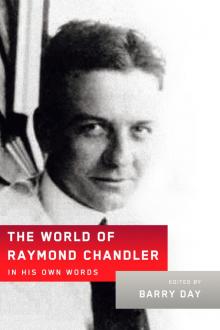 The World of Raymond Chandler: In His Own Words
The World of Raymond Chandler: In His Own Words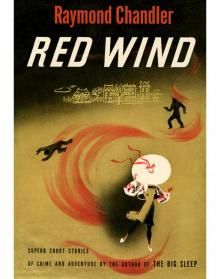 Red Wind: A Collection of Short Stories
Red Wind: A Collection of Short Stories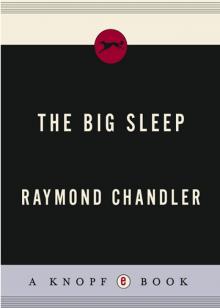 The Big Sleep
The Big Sleep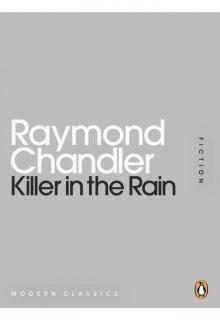 Killer in the Rain
Killer in the Rain Playback
Playback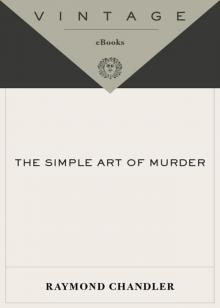 The Simple Art of Murder
The Simple Art of Murder The Bronze Door
The Bronze Door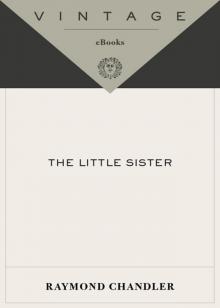 The Little Sister
The Little Sister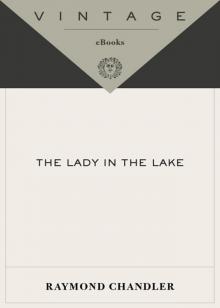 The Lady in the Lake
The Lady in the Lake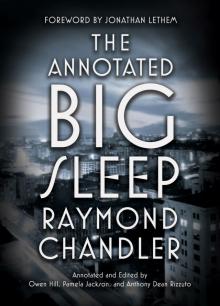 The Annotated Big Sleep
The Annotated Big Sleep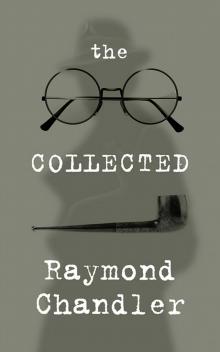 The Collected Raymond Chandler
The Collected Raymond Chandler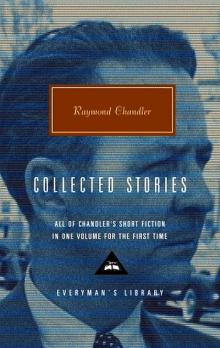 Collected Stories (Everyman's Library)
Collected Stories (Everyman's Library)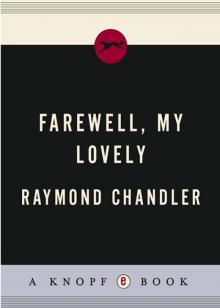 Farewell, My Lovely
Farewell, My Lovely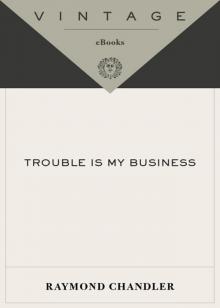 Trouble Is My Business
Trouble Is My Business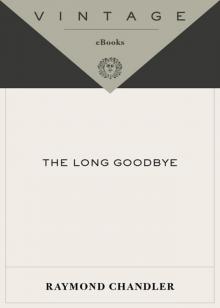 The Long Goodbye
The Long Goodbye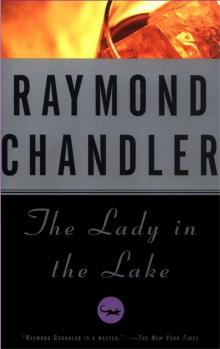 The Lady in the Lake pm-4
The Lady in the Lake pm-4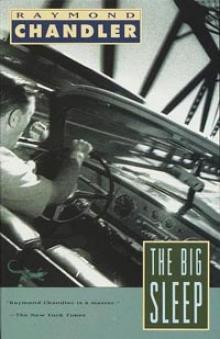 The Big Sleep pm-1
The Big Sleep pm-1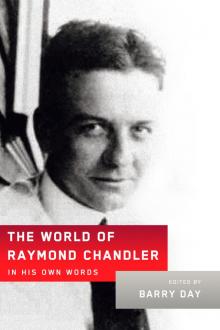 The World of Raymond Chandler
The World of Raymond Chandler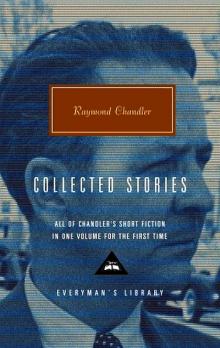 Collected Stories of Raymond Chandler
Collected Stories of Raymond Chandler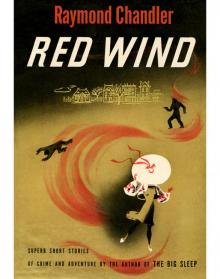 Red Wind
Red Wind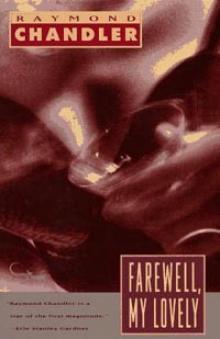 Farewell, My Lovely pm-2
Farewell, My Lovely pm-2 The Raymond Chandler Papers: Selected Letters and Nonfiction, 1909–1959
The Raymond Chandler Papers: Selected Letters and Nonfiction, 1909–1959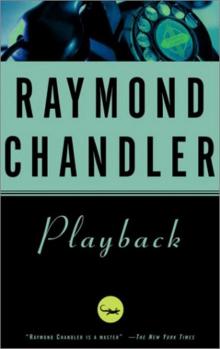 Playback pm-7
Playback pm-7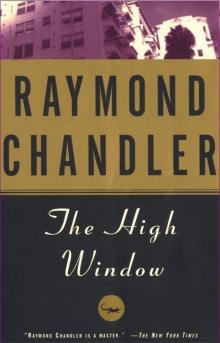 The High Window pm-3
The High Window pm-3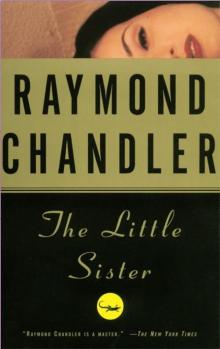 The Little Sister pm-5
The Little Sister pm-5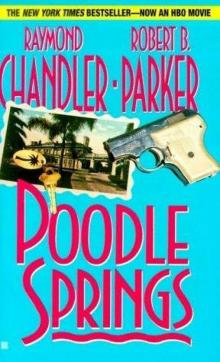 Poodle Springs (philip marlowe)
Poodle Springs (philip marlowe)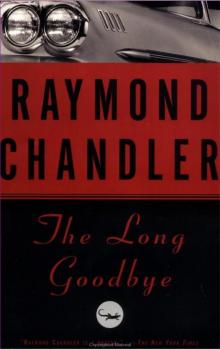 The Long Goodbye pm-6
The Long Goodbye pm-6